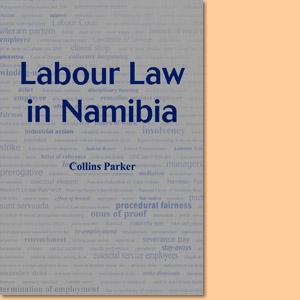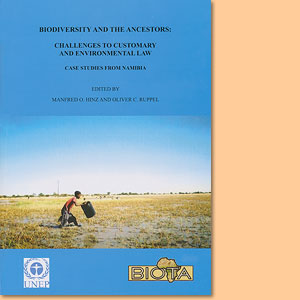Labour Law in Namibia, by Collins Parker
Written by an authority in the field of labour law, Dr. Collins Parker, this is a unique reference guide for key players in labour relations.
This book is a comprehensive work on labour (or employment) law in Namibia, where the common law of master and servant forms its fundamentally, as it does in other common law jurisdictions. However, today, labour law in Namibia (and in other common law countries) is dominated by statute. Thus, the Labour Act 2007 (Act No. 11 of 2007) represents the sum and substance of much of Namibia's labour law, which governs employment contracts. The book deals with the common law principles of employment relations applicable to Namibia and statutory modifications and amplifications of those principles by the Labour Act. It also treats other employment issues that are not even contemplated in the common law. Thus, the book examines, for instance, certain elements of labour law in Namibia that epitomize the political, social and economic realities of present-day employment relations that are found in most modern democratic and free societies like Namibia. Examples of those elements are the right of employees to form or join trade unions as employees' interests-promotion organizations, the right of employees to strike, the concept of unfair dismissal, collective bargaining, collective agreements, paid maternity leave, alternative dispute resolution mechanisms (i.e. conciliation, mediation and arbitration) and the Labour Court. In this connection, comparative references are made to the labour laws of some other Commonwealth countries, notably, South Africa, Swaziland, Zambia and the United Kingdom. Like Namibia's legal system, the legal system of the first two of these countries is based on the Roman-Dutch common law. Moreover, the first three countries and Namibia are all members of the Southern African Development Community (SADC). In a period of barely eighteen years, Namibia has endeavoured, and to a large part succeeded, to move away from the apartheid-infested system of employment relations to a system that is in tune with its democratic milieu and which conduces to the fulfilment of its international obligations under the relevant International Labour Organization (ILO) Conventions and Recommendations. The repealed Labour Act 1992 (Act No. 6 of 1992) did well to bring Namibia's labour law and practices to the level of international standards, particularly standards under ILO Conventions, to which Namibia is a State Party, and some ILO Recommendations. On the whole, the Labour Act 2007 has maintained the standards attained by the repealed Labour Act 1992. In that sense, the Labour Act 2007 does not depart markedly from the general policies and principles that shaped the repealed Labour Act 1992. There are, however, some remarkable features of the Labour Act 2007. It provides for comprehensive alternative dispute resolution mechanisms, namely conciliation, mediation and arbitration, and procedures for their implementation. It has done away with the power of magistrates' courts to sit as a labour court of first instance: the new Act has instead created a new Labour Court as a court of first instance in labour matters that fall under the Act. Another key feature of the Act is that it introduces fully paid maternity leave for employees who are subject to the Act. Lastly, for the first time in Namibia, the concept of unfair labour practice has found expression in Namibia's labour law. [...]
This is an excerpt from the book: Labour Law in Namibia, by Collins Parker.
Title: Labour Law in Namibia
Author: Collins Parker
Publisher: UNAM Press, University of Namibia
Windhoek, Namibia 2012
ISBN 9789991687018 / ISBN 978-99916-870-1-8
Softcover, 17x24, 336 pages
Parker, Collins im Namibiana-Buchangebot
Labour Law in Namibia
Labour Law in Namibia is the first comprehensive and scholarly text to analyse the Labour Act of 2007, and how it affects the common law principles of employment relations.
Weitere Buchempfehlungen
Knowledge lives in the lake. Case studies in environmental and customary law from southern Africa
Knowledge lives in the lake: Case studies in environmental and customary law from southern Africa presents research within the framework of the international Biodiversity Monitoring Transect Analysis in Africa (BIOTA) Project.
Namibia: The Sacred Trust of Civilization - Ideal and Reality, Volume 1
Bryan O’Linn, a giant on the Namibian legal scene over the past fifty years, wrote this volume 1 on the ideal and reality of the so-called sacred trust of civilization.
Namibia: The Sacred Trust of Civilization - Ideal and Reality, Volume 2
In Volume 2, Bryan O’Linn writes on the ideal and reality of the so-called sacred trust of civilization in Namibia.
Post-Apartheid Criticism. Perceptions of Whiteness, Homosexuality, and Democracy in South Africa
Post-Apartheid Criticism. Perceptions of Whiteness, Homosexuality, and Democracy in South Africa seeks to examine the contribution of post-apartheid narrative.
Biodiversity and the Ancestors. Challenges to Customary and environmental law case studies from Namibia
Spans an arc between legislative efforts on regional, national and local levels and traditional ways of maintaining the environment in Namibia







